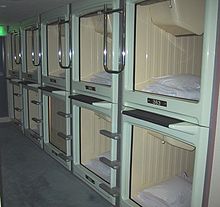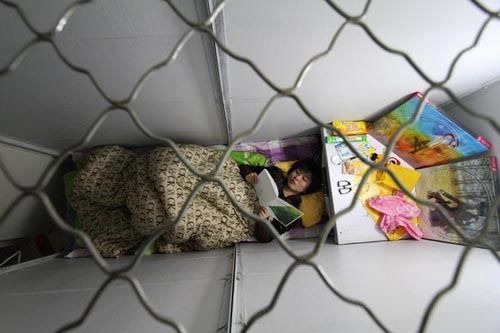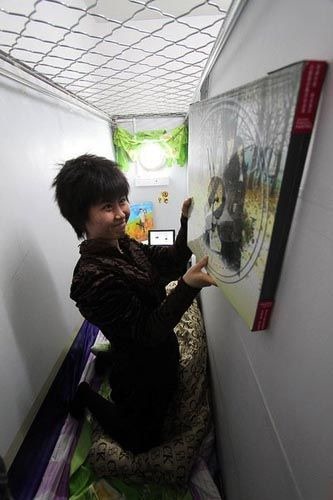Capsule Apartments - When is Small Too Small?
Retired engineer, Huang Rixin, is the man responsible for creating and patenting "capsule apartments". Huang, 78, says he was struck by the study of the so-called Ant Tribe - clustered settlements of college graduates who live outside the major cities. One of the tribes lives in Tangjialing village on the outskirts of the capital.
In China, students and newly-graduated workers swarm to the outskirts of the large cities in order to be able to afford accommodation. They live in cramped living quarters often sharing with others; and, often without plumbing or cooking facilities. They became known as the Ant Tribe when it was noticed how closely their behaviour resembled that of ants in colonies. Like ants, they all swarm out to work in the mornings moving in large groups from the outskirts of the cities to the inner cities where the work is. In the evenings, they all swarm back out the outskirts to sleep.
A trip to Tangjialing further strengthened the old man's decision to do something for these students. "After all, they are the future of our country," Huang says.
He had heard about Japanese capsule hotels - each a plastic or fiberglass module, measuring 2 m (6' 7") by 1 m (3' 3") and 1.25 m (4' 1") high, where the occupant sleeps, watches a mini television or surfs the Internet through a wireless connection - and decided to adapt this.
"I used to be a senior engineer designing hydraulic power stations. Designing the capsules was like killing a fly with a spear," he says.
So Huang took the plunge and invested 40,000 yuan ($5,860) to build eight cubicles, 2.4 m (7' 11" ) long, nearly 1.6 m (5' 3") high, and 0.72 m (2' 4") or 0.92 m (3') wide. He converted the three 7.5 sq m (24' 7") rooms he rented on the top floor of a three-story building in Liulangzhuang, a small village in Haidian district into the eight capsule apartments that he has now.

"Liulangzhuang is only two stops from Zhongguancun, where many graduates work. Rentals here are low as the area is located in the rural-urban fringe zone," Huang says. However, being so close to their place of work is a big bonus for many since many "worker ants" must travel hours a day on extremely crowded buses or other transit.
Compared to the coffin-size capsule hotels in Japan, Huang's capsule is relatively spacious, allowing most occupants to stand. The capsules themselves are extremely spartan with only an anti-theft door, a collapsible computer desk and Internet connection.
"I think this is more suited to college graduates, and less expensive," Huang says, adding that his aim is not to make a profit.
At first, Huang's concept received little serious interest. While there was a great deal of curiosity, most were doubtful of a unit less than 2 sq m where the only storage is at the foot of the bed or under it.
But things changed after Huang sent an e-mail to Beijing Youth Daily to present his idea. Suddenly, his capsule apartments attracted a lot of attention.
Last month, China's biggest Web portal Sina.com held a publicity event, inviting prospective tenants to spend half a month for free in these capsules. Some journalists were also convinced to participate so they could provide a first-hand account of how it felt.


Huang has now rented all eight capsules at a monthly rent of 200 to 250 yuan ($29-$37) each.
As one might expect, there have been many criticisms of the apartments; but, Huang responds: "The word 'comfortable' means different things to different people."
"If you are living in Tangjialing and sharing a small room with five others; or, if you are wandering on the street with nowhere to stay, then this place will definitely feel comfortable."
But...all is not sunny on the capsule apartment horizon. Already, some occupants are considering moving. They are finding the narrow space; lack of proper heating and cooling; lack of cooking facilities; lack of personal bathrooms; and, lack of privacy to be too burdensome and/or depressing.
Huang remains a proponent of his own creation, "I hope real estate developers will realize that there are still many poor university graduates looking for a place to stay. I wish they would convert some of their unsold high-priced homes into capsule apartments to rent out."
On top of this problem, the city of Beijing has just released their draft rules for housing rentals which were posted on the Beijing municipal government's website until May 15 for public comment. Huang may have run afoul of the new draft rules; and, be forced into changing and/or removing his capsule apartments.
According to the new draft rules, the per-person size of a rental unit should be no less than 10 sq. m.; and, each person's individual living space should not be smaller than 7.5 square meters.
Huang seems rather accepting of the new rules. "My capsule apartments fail to meet the required standards and I will have to move them to another place," he says.
He said he may rent a single-story house in a rural area and install his capsule apartments in it but he has not yet made up his mind. He said his intention has only ever been to offer compact and affordable homes to low-income Beijingers; not, to make money.
He is now questioning the draft, claiming the proposed standards could make some poor people homeless.
He says, "some low-income migrant workers or students can only afford the price of a small house and share the rent with four or even more roommates. If the draft is put into practice, house owners will have to rent homes to few people and that will surely add to the burden on those tenants."
"I am worried that the new regulation will make some of them homeless. What I can do now is better plan a new capsule apartment, which not only meets the standard but will also be attached to shared areas, such as washrooms and kitchens."
In the video below, please note that when the young girl goes in the first door and turns to put something on the shelf, that is the door to one of the original three rooms that Huang renovated into capsule apartments. The room she enters has been further separated into three more rooms - in effect, her apartment is 1/3 of a room.








